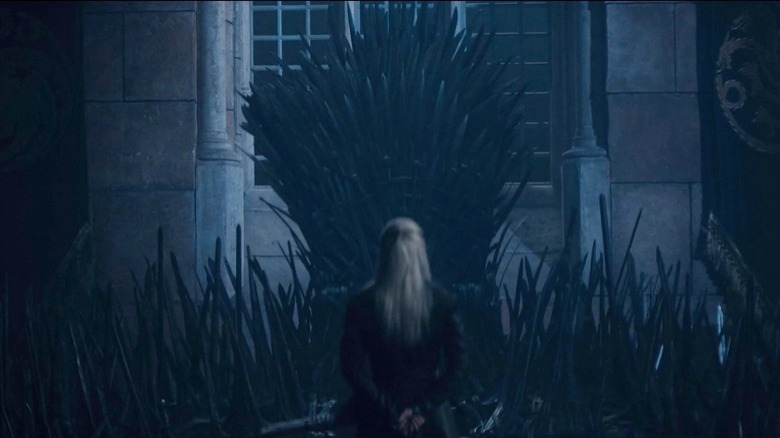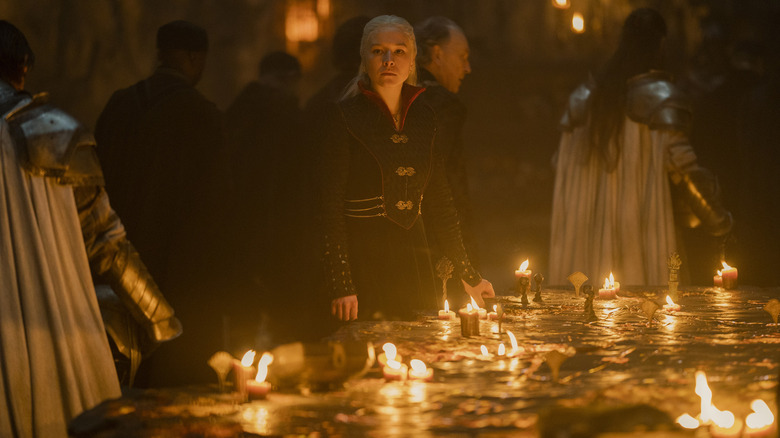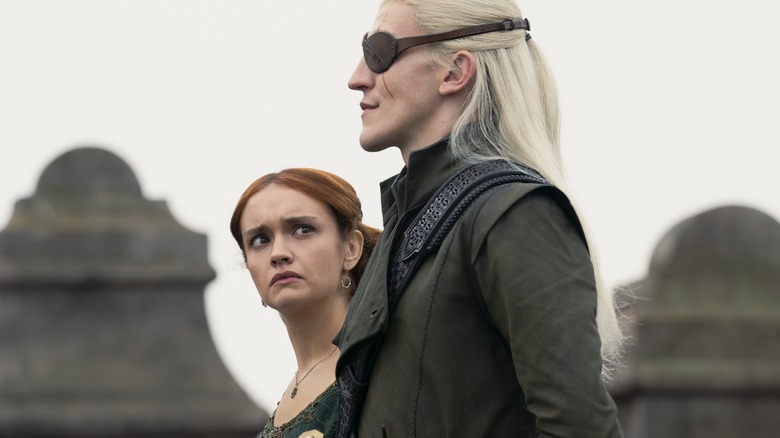How House Of The Dragon Is Making Up For Game Of Thrones' Biggest Misstep
Warning: This article contains dragon-sized spoilers for the latest episode of "House of the Dragon."
It's easy to forget that, when it debuted in 2011, "Game of Thrones" defined itself by very different standards than the ones audiences would eventually come to demand. During its initial seasons, we hardly ever experienced budget-breaking battles spanning the length of entire episodes or a gaudy sense of scale only one degree removed from blockbusters like "The Lord of the Rings." (In fact, even the show's first and arguably best action sequence was drastically reduced from the book to save money.) Instead, what really grabbed viewers in the first place was exactly what readers found so engrossing in author George R.R. Martin's "A Song of Ice and Fire" book series: the Machiavellian scheming that a broad range of characters tried and mostly failed to use to protect — or take over — the Iron Throne.
While "Game of Thrones" may have ultimately traded that identity away in favor of a less nuanced (but undeniably more spectacular) one, its prequel series isn't committing the same mistake so far. Don't look now, but "House of the Dragon" season 2 is making it feel like the early 2010s all over again in the best possible way. Granted, episode 5 was always doomed to feel like a comedown after (ironically) unleashing the brutal battle last week that finally lived up to the moniker "Dance of the Dragons," yet its retreat into table-setting mode actually comes as a breath of fresh air. That's because episode writer Ti Mikkel and director Clare Kilner made the very wise choice to channel "Game of Thrones" in its prime.
Right when we needed it most, "House of the Dragon" made a welcome return to the dirty, underhanded, and thoroughly satisfying joys of politics.
In House of the Dragon, the politics are the point
Maybe King Aegon's (Tom Glynn-Carney) risible actions at the Battle of Rook's Rest carried an important lesson for us all, both within the world of the series and especially in our own. While hopping onto the back of a dragon and flying into war guns blazing (or whatever the fire-breathing equivalent is) will inevitably get all the attention and glory, it also comes at a cost. For Aegon, we saw that cost up close and personal in that gruesome scene early on in the episode — you know, the one that makes it painfully clear what happens when Valyrian steel armor meets Vhagar's blazing temper. For our purposes here, the divisive final season of "Game of Thrones" proved that even reeling off the most awe-inspiring set pieces ever captured on camera can quickly wear thin if they have nothing else going for them.
As boring as they might seem in comparison, that's precisely why these scenes are so important, with kings and queens and their most trusted advisors simply ... sitting around, talking and arguing about and strategizing their next moves. In this episode alone, this manifests in practically every storyline scattered across Westeros: Daemon's (Matt Smith) attempts to bring the stubborn Brackens into the fold, Rhaenyra's (Emma D'Arcy) and Alicent's (Olivia Cooke) respective struggles to wage a war while still commanding the respect of their male-dominated councils, and even young Jacaerys' (Harry Collett) impromptu mission to negotiate with the Freys and secure passage for the army of Northmen Cregan Stark (Tom Taylor) promised him in the premiere.
In each instance, "House of the Dragon" continues to embrace the attention to political detail that "Game of Thrones" first established and creator/showrunner Ryan Condal has repeatedly emphasized throughout this series.
Actions and consequences on House of the Dragon
Still, even this particular brand of politics on display in "House of the Dragon" isn't enough to lead the prequel to the promised land, in and of itself. The real impetus behind the early success of "Game of Thrones" came from brilliantly-written scenes involving conniving characters like Conleth Hill's Varys and Aiden Gillan's Petyr "Littlefinger" Baelish throwing barbs and barely-concealed threats at one another or master manipulators like Tywin (Charles Dance) and Tyrion Lannister (Peter Dinklage) exercising power over anyone who gets in their way, even King Joffrey (Jack Gleeson). Plotting and scheming is one thing, sure, but it's quite another to know that these political ambitions would likely be their downfall — particularly in the cases of Tywin and, much later on, Littlefinger. In short, at that point in the original series, actions always had consequences.
Much the same holds true in "House of the Dragon," even if the ultimate fates of these characters haven't been sealed just yet. In the Riverlands, the renegade Prince (er, make that wannabe King) Daemon learns that his ruthless tactics to exploit the rivalry between the Brackens and Blackwoods and give him an army of his own might be effective in the short term ... though not without costing him the critical support of the other River-lords. In King's Landing, Aemond's murderous power play for the Throne leads to his new title as Regent but, well, does anyone seriously think this is the type of character who gets a happy ending? Hell, it's no coincidence that the episode ends on Rhaenyra and Jace coming up with a plan to find more dragonriders — a choice that, from what we've already seen of dragon warfare, could have disastrous results.
As much as all this petty political squabbling might bring about the downfall of the Targaryen dynasty, at least we can count on that as the very reason why "House of the Dragon" remains so watchable week in and week out. New episodes air on HBO and Max every Sunday night.


